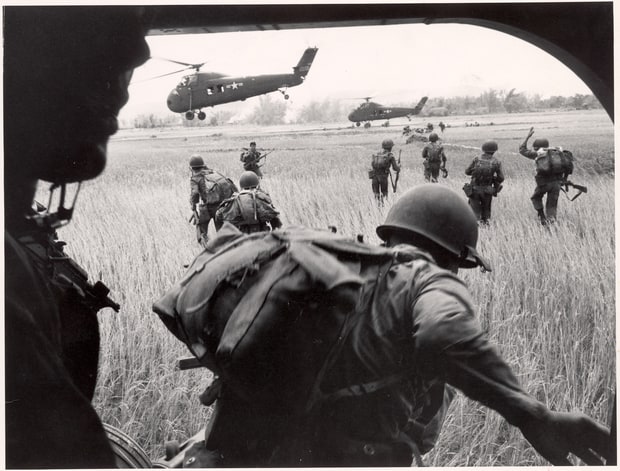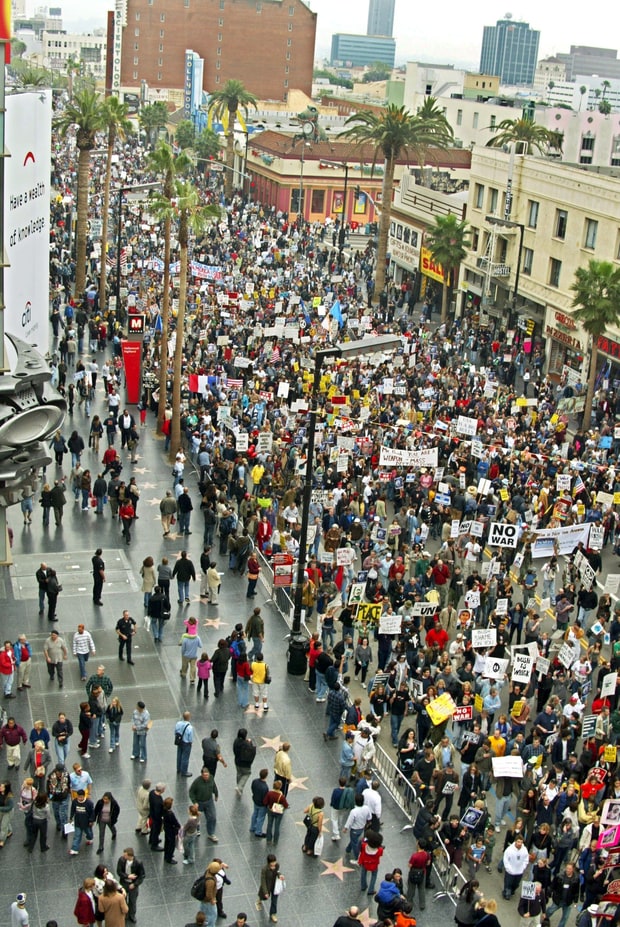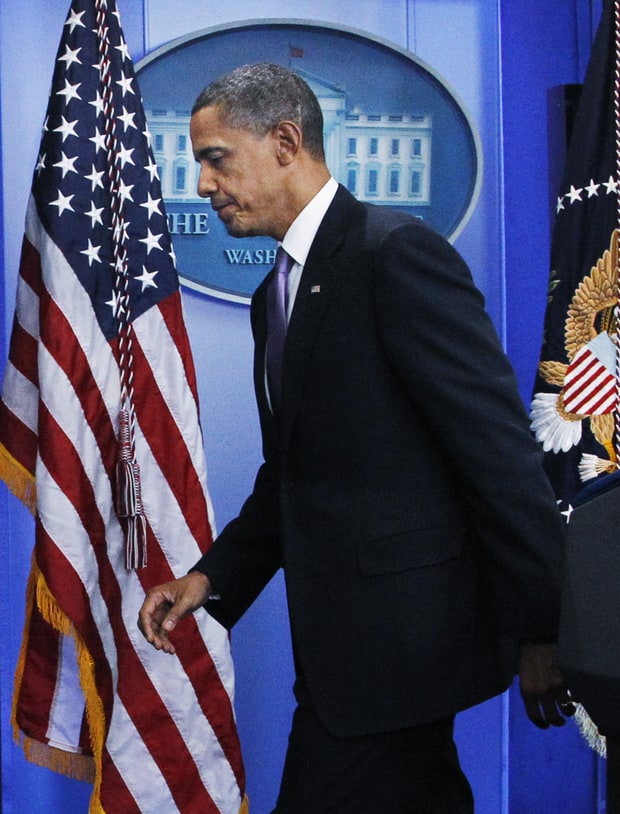Fifteen years ago this week, George W. Bush invaded Iraq. It was an awesome drama, made more thrilling by the seemingly obvious craziness of it all.
U.S.-backed forces are about to seize Raqqa – the capital of the most wanted terrorist group on earth – so why won't the government talk about it?
People were looking at each other out of the corners of their eyes, shrugging, and asking: Can we really do this without a reason? That was the dramatic subtext of the invasion.
In the press, no one could really make sense of the supposed justification for the invasion. That it was compelling, no one could deny. Hell, just look at the fonts. We all used the biggest ones we had! The New York Times said it all with its dramatic banner:
GOON BOMBS CITY ON HORSESHIT PRETEXT would have been more accurate, but editors were giving everyone the benefit of the doubt back then, and getting on board, for patriotic reasons. The Gray Lady, who was playing such a key role in what was going on, was certainly getting in the spirit, giving in to the adrenaline rush of Bush's evil gambit.
It was the same with CNN's breathless coverage of that first night, with the creepy green-hued night-cams showing explosion after monster explosion.
Shock and awe, we called it: a new plan for "achieving rapid dominance." What a great Hollywood name, and goddamn if people didn't sit glued to their TVs to watch its rollout, getting off like a bunch of kids blowing up frogs.
Wars are great TV. The prolonged political lead-up, the decision to kill, it's all rich with suspense, and when wedded to the sight and the sound of the bombs, after waiting all those months for one nightfall, at the hour of crime and sex, to launch the first sorties from a secret location at sea – it all trips the senses. It's a turn on. It makes the Super Bowl look like paint drying. The sheer drama is how they sold this thing to the public, fifteen years ago this week.
But that's not how our rulers sold the war to themselves. They weren't overcome with emotion, or some post-9/11 yearning for vengeance. They knew what they were doing.
The Iraq invasion, one of the great crimes of this or any age and destined to be a crossroads event in the history of America's decline, was instead a cold, calculated, opportunistic power grab, aimed as much at future targets, and even our own population, as at the Iraqi "enemy."
As citizens, we haven't started to reckon with any of this. We write it off rather than deal with it. In fact, when we think of Iraq at all, we often describe the invasion as a mistake. Embarrassingly, even I did this a few weeks back, talking about how we "blundered" into Iraq.
It's understandable. There are superficial plot elements from the Iraq narrative we lean on to soothe ourselves that the invasion was caused by an unlikely confluence of accidents and errors, not the inherent venality of our system.
We remember things that look on the outside like dumb miscalculations. First in line is the press corps that somehow all at once committed mass malpractice, falling for a plainly absurd WMD fable. It wasn't a systemic problem caused by knee-jerk belief of government sources and the exclusive handout of network air-time to spooks, retired generals, and military strategists – no, we just all fell for the same error.
Then there was the Bush administration, which appeared to sincerely believe we would be "greeted as liberators" in Iraq, and that we'd be able to establish a Mesopotamian Switzerland overnight.
The Democrats will tell you they were genuinely convinced voting for the war was politically necessary, and/or that they really believed the intelligence about Saddam's weapons programs.
Bullshit. The invasion was no mistake, and nobody above the age of eight believed the WMD story. Anyone who says otherwise is lying. We all knew what was going on.
Far from being an error, the war was a perfect expression of everything we stood for then, and still stand for now. And the survival of the comedy-of-errors explanation as popular media myth is almost as inexcusable as the original tidal wave of misreporting that preceded the invasion.
America by 2003 already had a long history of violent regime change. One study, cited recently in the Washington Post, concluded we tried to change other nations' governments a mind-blowing 72 timesbetween 1947 and 1989. Most of these efforts were justified under the aegis of the domino theory, i.e. that we had to step in to prevent the cancer-like spread of communism.
"If Indochina falls," Dwight Eisenhower for instance said way back in 1951, "the countries of Southeast Asia and Indonesia would follow, followed by India..."
The domino theory justified rigged votes, arrests and assassinations of elected leaders, installations of military rulers, terrorist operations (or "sabotage," as we called them in places like Cuba), even mass bombings of local populations. The death tolls from these operations are incredible – millions of civilians in Indochina alone. Of course, facing up to the shame of this blood-soaked past is not part of most American high school history courses.
If you ever want to feel fantastic about being American, watch this documentary showing Vietnamese parents weeping over their dead and napalmed children while Dick Nixon tells the world that "throughout the war in Vietnam, the United States has exercised a degree of restraint unparalleled in the annals of war."
Or: look at these maps showing the vast areas where we sprayed dioxin over that tiny agrarian country, using bombers to dump poison by the ton, causing a generation of people to be left deformed, suffering and alive, with misshapen and/or eyeless heads, like this. That's what our "unparalleled" restraint looked like.
After communism fell, the domino theory went with it, making it difficult for us to continue justifying this meddling. The Bill Clinton administration tried out the "humanitarian intervention" excuse in Kosovo, but how often could we play that card, really?
Still we continued the baseline practice of promoting colonial dictators in economically important regions. Which was odd because we continually lost ground over the years as we supported more and more ruthless regimes.
At the end of World War II, America had more power worldwide perhaps than any country in history. We controlled the Atlantic and the Pacific and our GDP was about 50% of the world economy. But from that point we experienced one foreign policy disaster after another.
We "lost" China (it was ours?) to a communist takeover in 1949. Vietnam fell out of French orbit in 1954, out of ours in the seventies. Iran threw us out in 1979. Castro overthrew Batista. The Sandinistas overthrew Somoza. We even got the Russians in our clutches after communism fell, but after one brief decade of brutal reform policies (leading to millions of premature deaths in an unprecedented economic disaster) and rigged elections, we lost them, too, to a nationalist backlash that replaced our vicious puppet Yeltsin with the equally vicious Putin.
The consistent thread throughout all of these foreign policy losses was our relentless, stubborn belief that would have succeeded, if only we'd been allowed to use more force and violence.
Whether it was Vietnam or Indonesia or the Dominican Republic or the Philippines or Iran or Chile or wherever, we consistently ignored our inability to connect and compromise with impoverished foreign populations, and instead blamed failures of technology and/military tactics.
The terrorist attacks on 9/11 opened the door to finally take that dream of unimpeded power out for a drive. Al-Qaeda provided the perfect replacement for the domino theory. Here was an enemy that was at once everywhere and nowhere, that could be in the minds of any person here or abroad, that any country could be accused of sponsoring.
Moreover a unique feature of terrorism was no one could ever say it was completely contained. As canny readers pointed out, the asinine color-coded Homeland Security Threat Matrix created to scare us throughout the War On Terror, which supposedly ranged from red (severe threat) to green (low risk of terrorist attacks), was never once green, not for one day, in the entire history of its existence.
From the moment the towers fell, the authorities told us no one could ever relax again. The implication was that only a continually expanding regime of extreme vigilance could successfully fight this new menace.
Americans agreed. They were so terrified by the sight of falling towers and dead civilians on their own territory that they gave a thumbs-up, or at least didn't protest much, at each request for expanded power the military and the government made during this time.
Secret prisons? Sure. Torture? Sure. Warrantless surveillance? Sure. Need to read our library records, toss out habeas corpus? Sure and sure.
The press, too, rolled over when the military insisted we not show photos of dead soldiers in the war. No backstabbing this time!
And it went without saying that showing videos of Americans killing Iraqi civilians became particularly taboo in major media, to the point where the broadcast of the chilling "Collateral Murder" video via Wikileaks led to actual espionage charges against Chelsea Manning.
It can't be underscored how important that series of events was. It was proof that the lesson we learned from places like Vietnam was that the real enemy did not live in bushes and hamlets, but in front of TVs in places like Oklahoma and Pennsylvania.
If we could successfully prevent our own voters from seeing or thinking about the moral costs of our policies, then we could continue down the pure-force path indefinitely, without protest, without debate even.
The Beltway thinkers turned out to be correct on that score. Before the invasion of Iraq, the protest movement was as intense as ever. On February 15, 2003, a month before the invasion, somewhere betweensix and eleven million people marched against the war worldwide, in what some describe as the largest protest in history.
But from the day the war began, the outrage began to recede. We started to hear all sorts of new terms batted around, including particularly the concept of "surgical strikes" – an insane Pentagon fantasy in which our increasingly powerful explosive devices would somehow only kill guilty people and destroy purely military infrastructure. No kids, no old people, no cows, no reservoirs or hospitals. Just targets.
But when the war didn't really end and just quietly went on as an unending and mostly unmanned bombing campaign using the entire Middle East as a staging area, the public slowly started to accept more and more the idea of a victimless war. Fifteen years after the invasion, in fact, this would be understood virtually in a literal sense.
The R.A.F. for instance, last year claimed it dropped over 3,400 bombs in Syria and Iraq, but said there was "no evidence" of civilian casualties. France similarly claimed 1,300 sorties, but la France n'a fait aucune victime civile – France created no civilian casualties. The Americans now claim just one civilian death per 157 air strikes.
The public buys all of it. Because the vast majority of reporters who visited the Iraq theater beginning in 2003 agreed to be embedded with American soldiers on Forward Operating Bases (FOBs) – even I did this – we rarely saw the destruction we caused beyond the walls, the civilian deaths, the misery and outrage.
The concept of bloodless war – like some twisted Rand Corporation interpretation of Erica Jong's "zipless fuck" – has as a result become firmly submerged in the American unconscious. Fifteen years after those historic marches preceding the invasion, we still drone-bomb with mind-numbing regularity, killing about 6,000 people in Iraq and Syria last year alone. But protests are basically nonexistent.
We've defanged popular opposition by making such bombings open-ended, mechanical and invisible. The invisibility is not just in the eyes of the media, but more and more, in the eyes of the law as well. Our wars have begun to vanish from our legal process, the same way our "enemy combatants" just magically disappear from the earth once captured, to a secret arbitrary world we show or don't show as we please.
The legal disappearing trick evolved over several presidencies, and particularly advanced under Barack Obama, under whose leadership a remarkable progression took place.
The Obama White House for years wrung its hands publicly about the justification for drone assassination. When in September of 2011 it killed by drone in Yemen a cleric named Anwar al-Aulaqi, who was born in New Mexico, the administration foolishly felt a need at first to try to articulate a legal reason for killing an American without trial.
"What constitutes due process in this case is due process in war," a White House official said, alluding to a Justice Department memorandum that apparently existed to provide a legal context for killing even American citizens by fiat.
But the position of the state evolved. Soon, rather than bother sharing with the public what justification may or may not exist for these programs, the government moved to a new policy of simply asserting that these operations are classified and therefore not an issue, legally speaking.
When the ACLU asked under the Freedom of Information Act for documents pertaining to the drone killings, the CIA replied that the "fact of the existence or nonexistence" of the program was secret. So, they said, go screw.
The ACLU sued, saying that then-CIA chief Leon Panetta obviated the secrecy by talking about "hits" and "strikes." But a federal judge sided with the state, saying Panetta "never acknowledged the CIA's involvement in such [a] program."
"Plots to attack the United States increasingly involve U.S. persons, American citizens," then-Homeland Security Secretary Janet Napolitano said in 2011.
A few years later we discovered that the authorities had unilaterally green-lit a sweeping surveillance program here at home, capturing the phone conversations and emails of millions of Americans without our consent or knowledge, presumably out of concern for this threat.
We found this out by accident, after whistleblower Edward Snowden leaked the news on his way into permanent exile. This was after senior intelligence officials like current liberal hero James Clapper openly lied to congress about the existence of the vast extralegal spy regime.
This is the legacy of the Iraq war. It began with a crude congressional dog-and-pony show giving Bush approval for the invasion, and was followed by an equally thin presentation to the U.N. by sad-sack Colin Powell. These two transparently stupid pre-war petitions secured for the war the tiniest of fig-leafs of domestic and international legal legitimacy.
A decade and a half later, authorities no longer need to ask anyone permission to do anything. They've created in the interim an entirely separate, secret set of rules giving them the right to kill, imprison, torture, or spy on anyone.
A permanent war bureaucracy, invisible beyond the executive branch. It's the ultimate fantasy of all those Washington security think-tank types who spent their teen years playing Risk and jerking off to Bismarck biographies and then simmered with resentment throughout the seventies, eighties and nineties, sure they'd never have lost Cuba, Vietnam, Nicaragua, China, Iran, and a dozen other places, if they'd only been given the proper tools and not subjected to idiocies like the Church hearings and the Iran-Contra prosecutions.
Now they have those tools. They got the world they wanted.
The chaos this has caused in the Middle East is well-documented. But the damage all this has done to our national psyche at home has been awesome, far-reaching, and poorly understood.
It was for sure a contributing factor in the election of Donald Trump, whose total ignorance and disrespect for both the law and the rights of people deviates not one iota from our official policies as they've evolved in the last fifteen years.
Trump is just too stupid to use the antiseptic terminology we once thought we had to cook up to cloak our barbarism. He says "torture" instead of "enhanced interrogation" because he can't remember what the difference is supposed to be. Which is understandable. Fifteen years is a long time for a rotting brain to keep up a pretense.
We flatter ourselves that Trump is an aberration. He isn't. He's a depraved, cowardly, above-the-law bully, just like the country we've allowed ourselves to become in the last fifteen years.
That we now deserve him as president is a consequence of the final lesson of the Iraq debacle: We lost that war. Not militarily maybe, but in the sense that we so completely dismantled what was left of our civil society in prosecution of it that, looking back, a battlefield loss would surely have been preferable.
Wherever he is now, as eels perhaps slither through his eye-holes, Osama bin Laden has to be laughing. He had to know all along that only Americans were capable of destroying America. But he couldn't have dreamed we'd do it so fast.
Source: www.rollingstone.com/politics/news/taibbi-the-legacy-of-the-iraq-war-w518193





 RSS Feed
RSS Feed